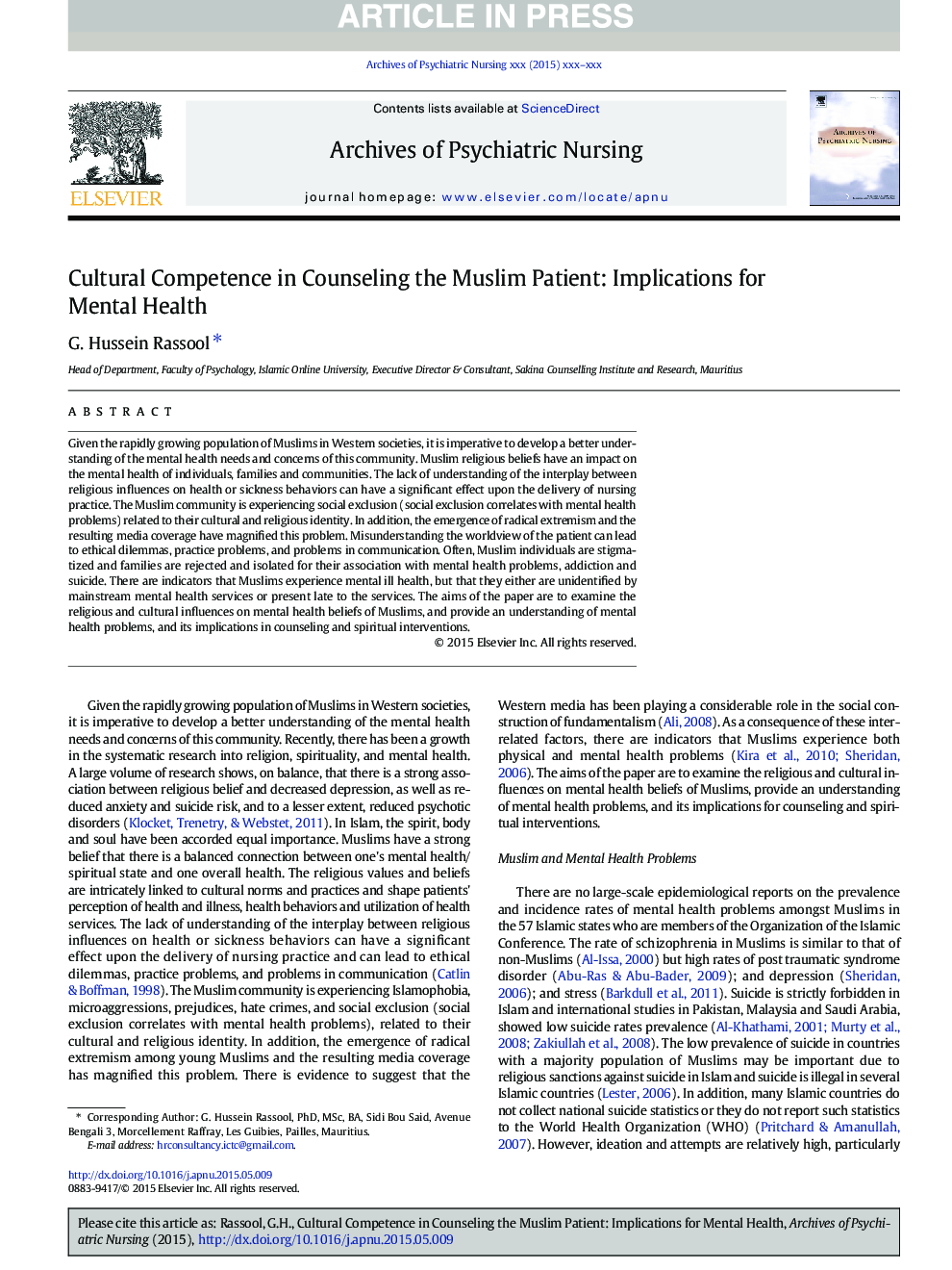| کد مقاله | کد نشریه | سال انتشار | مقاله انگلیسی | نسخه تمام متن |
|---|---|---|---|---|
| 6787036 | 1432465 | 2015 | 5 صفحه PDF | دانلود رایگان |
عنوان انگلیسی مقاله ISI
Cultural Competence in Counseling the Muslim Patient: Implications for Mental Health
ترجمه فارسی عنوان
صلاحیت فرهنگی در مشاوره بیمار مسلمان: پیامدهای سلامت روانی
دانلود مقاله + سفارش ترجمه
دانلود مقاله ISI انگلیسی
رایگان برای ایرانیان
ترجمه چکیده
با در نظر گرفتن جمعیت رو به رشد جمعیت مسلمانان در جوامع غربی، ضروری است که درک بهتر نیازهای بهداشت روان و نگرانی های این جامعه را توسعه دهیم. اعتقادات مذهبی مسلمان بر سلامت روان افراد، خانواده ها و جوامع تاثیر می گذارد. فقدان درک اثر متقابل بین تأثیرات مذهبی بر سلامت و رفتارهای بیمار می تواند تأثیر قابل توجهی روی تحویل تمرین پرستاری داشته باشد. جامعه مسلمان در حال رفع انزوا (جدایی اجتماعی با مشکلات روحی روانی) مرتبط با هویت فرهنگی و مذهبی آنها است. علاوه بر این، ظهور افراط گرایی رادیکال و پوشش رسانه ای آن، این مشکل را افزایش داده است. ناسازگاری در جهان بینی بیمار می تواند منجر به معضلات اخلاقی، مشکلات عمل و مشکلات ارتباطی شود. اغلب افراد مسلمان از بین می روند و خانواده ها برای ارتباط با مشکلات روحی روانی، اعتیاد و خودکشی از بین می روند. شاخص هایی وجود دارد که مسلمانان سلامت روانی را تجربه می کنند، اما آنها با خدمات بهداشت روانی جسمی یا ارائه خدمات به آنها دیر نیستند. هدف از این مقاله بررسی تأثیرات مذهبی و فرهنگی بر باورهای سلامت روان مسلمانان است و درک مشکلات سلامت روانی و پیامدهای آن در مداخلات مشاوره و روحی را ارائه می دهد.
موضوعات مرتبط
علوم پزشکی و سلامت
پزشکی و دندانپزشکی
روانپزشکی و بهداشت روانی
چکیده انگلیسی
Given the rapidly growing population of Muslims in Western societies, it is imperative to develop a better understanding of the mental health needs and concerns of this community. Muslim religious beliefs have an impact on the mental health of individuals, families and communities. The lack of understanding of the interplay between religious influences on health or sickness behaviors can have a significant effect upon the delivery of nursing practice. The Muslim community is experiencing social exclusion (social exclusion correlates with mental health problems) related to their cultural and religious identity. In addition, the emergence of radical extremism and the resulting media coverage have magnified this problem. Misunderstanding the worldview of the patient can lead to ethical dilemmas, practice problems, and problems in communication. Often, Muslim individuals are stigmatized and families are rejected and isolated for their association with mental health problems, addiction and suicide. There are indicators that Muslims experience mental ill health, but that they either are unidentified by mainstream mental health services or present late to the services. The aims of the paper are to examine the religious and cultural influences on mental health beliefs of Muslims, and provide an understanding of mental health problems, and its implications in counseling and spiritual interventions.
ناشر
Database: Elsevier - ScienceDirect (ساینس دایرکت)
Journal: Archives of Psychiatric Nursing - Volume 29, Issue 5, October 2015, Pages 321-325
Journal: Archives of Psychiatric Nursing - Volume 29, Issue 5, October 2015, Pages 321-325
نویسندگان
G. Hussein Rassool,
